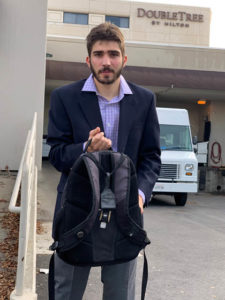Scott’s Story
The Beginning
Scott was born on August 22, 1995. He emerged with 10 fingers, and 10 toes, along with an outstanding APGAR score. As new parents, we thought we could finally take a breath. All went well, he’s “normal.” Since Scott was our first child, we really didn’t have any prior history with typical child behaviors. He appeared to be a happy, healthy child. He could be fussy at times, but we attributed that to colic.
Scott had a huge vocabulary at a very young age. He could recite his ABCs, count to 20 and had many books memorized. When Scott was only 18 months old, one of his caregivers told us that she thought Scott was “gifted.” In retrospect, that might have been her way of telling us something was off. We just laughed it off and took it as a compliment. We didn’t realize at the time that Scott’s language was primarily a vehicle for self-stimulation rather than communication. He liked to label and point at objects, often repeatedly. He loved to do puzzles and was quite good at them.
We did notice some strange behaviors, such as preferring to walk around the perimeter of the neighborhood park again and again, rather than playing on the equipment. I still recall going to the zoo and rather than Scott commenting on the animals, he remarked “look at he all the triangles,” referring to the pattern in the chained link fence. He also liked to recite the numbers and letters on license plates.
Scott started attending our Temple preschool at the age of 2. Steve and I were so excited to attend our first conference with his teachers. We expected to get a glowing report about Scott. We sat down and his teacher said to us, “You know, all kids develop at different rates, but something seems off about Scott.” I couldn’t believe what I was hearing, I will never forget this day. His teachers were concerned about his language, social skills and repetitive language. She recommended that we have Scott checked out.
So, the journey began. We went to see our primary care doctor who observed Scott labeling every toy in his exam room. He thought the teacher was wrong but agreed to refer us to a pediatric neurologist. That meeting cascaded into an auditory evaluation at Children’s Hospital to make sure he could hear properly and a speech and language evaluation.
His initial diagnosis was a communications disorder associated with a developmental delay. The doctor’s recommendations included speech and language therapy along with a floortime therapy for expanding his developmental skills. Six months later, after further evaluation, his neuro-developmental profile fell into range of Autism Spectrum Disorder.
So, we began the process of getting Scott into the Regional Center along with the Special Education Program at Oakland Unified School District. In addition, therapy was recommended in speech and language, occupational therapy, and behavioral intervention. All of this was quite overwhelming especially when we had a second child due in less than three months.
In all honesty, I really did not know much about autism other than Rain Man, but I immersed myself in learning as much I could by reading, attending conferences, becoming active in the local Community Advisory Council and connecting with other parents with autism.
Over the years, we experimented with a variety of therapies: Applied Behavioral Analysis, diet restrictions, music therapy, medications, social skills groups, etc. At the same time, we tried to provide a somewhat normal upbringing for our “neurotypical” daughter, Jenna, who just adored her brother.
 Fast Forward – 20 years.
Fast Forward – 20 years.
Scott is now 23 years old. He was part of the Oakland Unified School District Special Education Program for 19 years, including 4 in the adult transition program. He was part of the Toolworks Day Program for one year where he got the opportunity to volunteer in many businesses in the community.
Scott excels at doing simple, straightforward, routine tasks. He loves to work and help around the house. Without prompts, he makes all the beds in the morning, gets dressed, sets the table for breakfast, empties the dishwasher, takes out the trash, etc. He always wants to help prepare dinner, help Dad with chores, or clear the dishes regardless of setting or environment. For Scott, work is play and play is work. He enjoys being busy.
Scott’s strengths have transitioned him to an internship with Project Search at the Doubletree Hilton in Pleasanton. It started on September 2018 and will continue until May, 2019. He has spent time in hospitality and food and beverage. He frequently participates at the Stable Cafe waiting on tables and bussing tables which he enjoys.
He is not a chatty guy, but clearly states his wants and needs. Scott is keenly observant which is very helpful especially when you forget where you put your keys or parked your car. Scott can always find it. He will need support services in many areas over his lifetime since he lacks capacity in cognitive judgment and reasoning. He also needs supports for social opportunities and outings.
It would be a dream come true if Scott could secure a position at the DoubleTree and live in the Sunflower Hill Community or Irby Ranch Development. The Sunflower Hill Development could potentially fill his needs.
Written by Amy Tessler